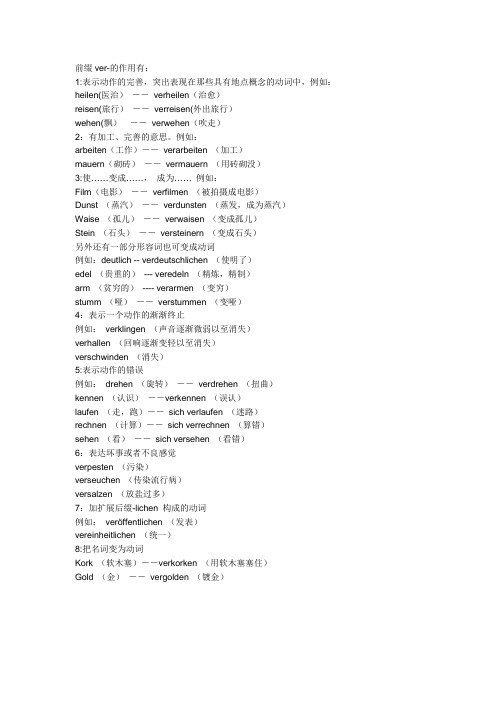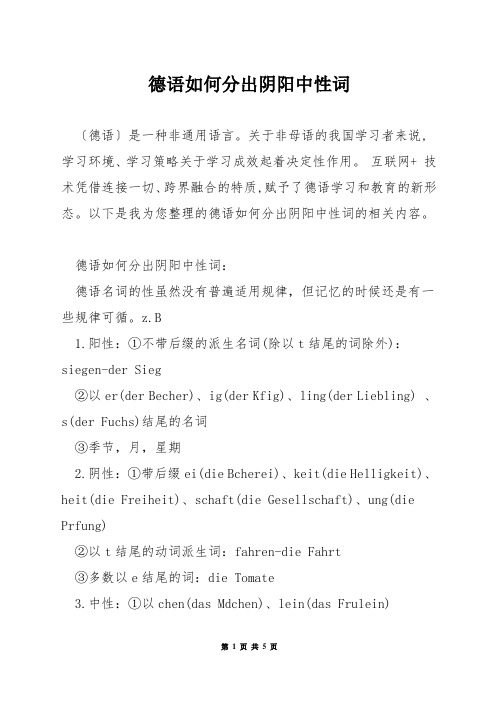德语构词法(派生:前缀与后缀)
- 格式:doc
- 大小:44.00 KB
- 文档页数:7

artificial的构词法"Artificial" 这个词的构词法属于派生法(Derivation),具体来说是通过添加前缀来改变一个词的意义。
在"artificial" 这个词中,词根是"fact" 或"fac",它与"做" 或"制作" 有关。
而前缀"arti-" 来自于拉丁语"artus",意味着"由手" 或"用手工制作的"。
当"arti-" 这个前缀添加到词根"fact" 或"fac" 前,就形成了"artificial",表示"人工的" 或"非自然的"。
派生法是一种常用的构词法,通过添加前缀、后缀或改变词根的形式来创造新词或改变原有词的意义。
在英语中,前缀可以改变词的意义,后缀可以改变词的词性,而词根则提供了词的基本意义。
例如,通过添加不同的前缀,我们可以从"fact" 或"fac" 这个词根派生出一系列与制作或行为有关的词,如"factory"(工厂)、"facilitate"(使容易)等。
同样地,通过添加不同的后缀,我们可以改变"fact" 或"fac" 的词性,如"faction"(派系、小集团)就是一个名词形式。
总之,"artificial" 的构词法属于派生法,通过添加前缀"arti-" 来改变词根"fact" 或"fac" 的意义,表示"人工的" 或"非自然的"。

前缀ver-的作用有:1:表示动作的完善,突出表现在那些具有地点概念的动词中,例如:heilen(医治)--verheilen(治愈)reisen(旅行)--verreisen(外出旅行)wehen(飘)--verwehen(吹走)2:有加工、完善的意思。
例如:arbeiten(工作)--verarbeiten (加工)mauern(砌砖)--vermauern (用砖砌没)3:使……变成……,成为…… 例如:Film(电影)--verfilmen (被拍摄成电影)Dunst (蒸汽)--verdunsten (蒸发,成为蒸汽)Waise (孤儿)--verwaisen (变成孤儿)Stein (石头)--versteinern (变成石头)另外还有一部分形容词也可变成动词例如:deutlich -- verdeutschlichen (使明了)edel (贵重的)--- veredeln (精炼,精制)arm (贫穷的)---- verarmen (变穷)stumm (哑)--verstummen (变哑)4:表示一个动作的渐渐终止例如:verklingen (声音逐渐微弱以至消失)verhallen (回响逐渐变轻以至消失)verschwinden (消失)5:表示动作的错误例如:drehen (旋转)--verdrehen (扭曲)kennen (认识)--verkennen (误认)laufen (走,跑)--sich verlaufen (迷路)rechnen (计算)--sich verrechnen (算错)sehen (看)--sich versehen (看错)6:表达坏事或者不良感觉verpesten (污染)verseuchen (传染流行病)versalzen (放盐过多)7:加扩展后缀-lichen 构成的动词例如:veröffentlichen (发表)vereinheitlichen (统一)8:把名词变为动词Kork (软木塞)--verkorken (用软木塞塞住)Gold (金)--vergolden (镀金)前缀be-的作用1:使不及物动词变为及物例如:antworten (auf) --beantworten (回答)zweifeln (an) --bezweifeln (怀疑)2:使及物动词的支配关系发生变化,有人三物四的支配关系变为人四物三例如:j-m Waren liefern -j-n mit Waren beliefern (送货给某人)3:由名词be - 构成的动词表示用词干所表述的东西装在某物上例如: die Flagge --beflaggen (用旗来装饰)das Bild --bebildern (给……配图)die Fracht -- - befrachten (给……装上货物)由此引申出来的词还有:beglücken (使……感到幸福)beauftragen (委托)beruhigen (使安心)belustigen (使开心)los是英语中的less,lich是ly的意思(表adj或者adv)ab-表示脱离,离去:abfliegen(起飞,飞走), abgeben(交出), abfließen(流出,流去), abziehen (拉去,除去),abnehmen(拿去)表示向下:absteigen(下降,下车), abspringen(跳下)表示过程的中止:abbrennen(烧光),abnutzen(用久,用坏),abkühlen(冷却下去)表示照搬:abmalen(临摹),abschreiben(抄下)表示取消:abbestellen (取消预定),abmelden(注销),abrüsten(裁军)表示降低,减少:abnehmen, absenken,(非德语德国网站授权禁止转载)an-一般以an为可分前缀的东西都是及物动词。

词法学(德语语言学)
词法学就是研究语言结构的最小单位------词,是怎样组成的科学。
它的研究对象包括:词的内部结构,构词规律及其方法。
它是使用特定手段构成新词的规则和方法的总和。
词法学包括两部分:语素法和构词法。
根据词的各部分功能切分时,每个更小的单位叫做语素
德语语素分类
根据语素结构,语素可划分为两类:
独立语素|自由语素:它是独立为词的语素,有语义不可再分。
非独立语素|粘着语素:指词的词干、词缀。
词缀可分为前缀,中缀,后缀。
根据功能分类:变格,变位
语义语素
语法语素
构词语素
德语构词:可分为简单词,派生词,复合词,词类转换等。

德语如何分出阴阳中性词〔德语〕是一种非通用语言。
关于非母语的我国学习者来说,学习环境、学习策略关于学习成效起着决定性作用。
互联网+ 技术凭借连接一切、跨界融合的特质,赋予了德语学习和教育的新形态。
以下是我为您整理的德语如何分出阴阳中性词的相关内容。
德语如何分出阴阳中性词:德语名词的性虽然没有普遍适用规律,但记忆的时候还是有一些规律可循。
z.B1.阳性:①不带后缀的派生名词(除以t结尾的词除外):siegen-der Sieg②以er(der Becher)、ig(der Kfig)、ling(der Liebling) 、s(der Fuchs)结尾的名词③季节,月,星期2.阴性:①带后缀ei(die Bcherei)、keit(die Helligkeit)、heit(die Freiheit)、schaft(die Gesellschaft)、ung(die Prfung)②以t结尾的动词派生词:fahren-die Fahrt③多数以e结尾的词:die Tomate3.中性:①以chen(das Mdchen)、lein(das Frulein)②带前缀Ge的集合概念:das Geschrei③名词化不定式:das Lernen④物理单位、颜色、化学元素、字母、语言名称这些不是规律的定义,但是在学习德语时对词性的记忆是很有帮助的。
德语的名词在与格时的特点:关于单数阳性名词及其中性名词在与格时,定冠词用dem,而不定冠词用einem,否定形式用keinem.有部分特别词汇,例如der Assistent,der Junge,derPilot,der Journalist,der Student等在与格时除了定冠词的变化,名词词尾还要加en.举个例子:der Assistent 在与格的形式是dem Assistenten 关于阴性名词单数,与格形式定冠词是der,不定冠词是einer,否定形式用keiner.复数形式相对容易。

德语不同名词的前后缀用法规则德语不同名词的前后缀用法规则导语:位于词根前面的部分就是前缀,位于词根后面的部分就是后缀,前后缀可以改变词的意思。
下面YJBYS店铺讲解德语不同名词的前后缀用法规则,欢迎参考!I - 阳性名词1) 带如下拉丁或希腊语系的词尾/后缀的名词为阳性弱变化名词,其重音在后缀上:der Adjuntant (en en) 副官 der Protestant (en en) 抗议者der Aristokrat (en en) 贵族 der Autokrat (en en) 独裁der Philosoph (en en) 哲学家 der Theosoph (en en) 通神学der Philolog(e) (en en) 语言学家 der Theolog(e) (en en) 神学家der Poet (en en) 诗人 der Komet (en en) 彗星der Pianist (en en) 钢琴家 der Prokurist (en en) 代理人der Bandit (en en) 土匪 der Jesuit (en en) 耶酥会会士der Geograph (en en) 地理学家 der Telegraph (en en) 电报der Enthusiast (en en) 热心人 der Phantast (en en) 空想家der Kamerad (en en) 同志 der Advokat (en en) 律师der Kandidat (en en) 候选人 der Magistrat (en en) 高级官员还有带外来语后缀al, ar, ent, eur, ier, or, us 的词,也为阳性:der General (s e ) 将军 der Ingenieur (s e ) 工程师der Student (en en) 学生 der Kasus (- - ) (语法:格)2) 动词去掉词尾en,加er,形成阳性名词,指做动作的人,复数不再改变词尾:besuchen der Besucher lehren der Lehrer3) 阳性名词前加erz,表示大,为主或首要的意思,复数和原词相同:der Bischof der Erzbischof die Erzbischoefe4) 大多数表示阳性生物的名词,都为阳性:der Arbeiter 工人 der Loewe 雄师der Vater 父亲 der Hahn 公鸡5) 四季,月份,周日,都为阳性:der Fruehling 春天 der Mai 五月der Montag 周一 der Sonntag 周日6) 表示方向的词,都为阳性:der Osten 东方 der Westen 西方7) 表示风霜雨雪的词,都为阳性:der Regen 雨 der Wind 风der Schnee 雪 der Reif 霜8) 大多数以en结尾(但不包括动名词或以chen结尾的词),为阳性:der Hafen 港口 der Laden 商店9) 各种汽车名词,都为阳性:der VW(Volkswagen) 大众汽车der LKW(Lastkraftwagen) 载重汽车10) 大多数带er, el, ling, s, ich, ig 词尾的名词,为阳性:der Lehrer der Schluesselder Lehrling der TeppichDer Koks der HonigII - 阴性名词1) 表示人的名词后加in则成为阴性名词,其复数形式是:innender Protestant 变成阴性:die Protestantin 成复数:die Protestantinnen2) 动词后加rei变来的名词为阴性,复数为:reienbacken die Baeckerei die Baeckereien3) 形容词或名词后加heit形成的词为阴性,复数形式为:heitenfrei die Freiheit die Freiheitenschoen die Schoenheit die Schoenheitender Mensch die Menschheit die Menschheiten4) 在词尾为ig, bar或sam的形容词后加keit形成的词为阴性,复数形式为:keitendankbar die Dankbarkeit die Dankbarkeitenlangsam die Langsamkeit die Langsamkeitentraurig die Traurigkeit die Traurigkeiten5) 动词去掉词尾en后加ung形成的词为阴性,复数形式为:ungenwarnen die Warnung die Warnungenmeinen die Meinung die Meinungenverbinden die Verbindung die Verbindungen6) 名词后后加schaft形成的词为阴性,复数形式为:schaftender Feind die Feindschaft die Feindschaftendas Wissen die Wissenschaft die Wissenschaftendas Land die Landschaft die Landschaften7) 从外来语转化而来词尾为e的词是阴性,复数形式为:endie Adresse die Adressendie Methode die Methoden8) 词尾为sion或tion的'词是阴性,复数形式为:sionen 或tionendie Division die Divisionendie Portion die Portionen9) 词尾为taet的词是阴性,复数形式为:taetendie Qualitaet die Qualitaeten10)词尾为ur的词是阴性,复数形式为:urendie Natur die Naturen11)词尾为enz或anz的词是阴性,复数形式为:enzen 或 anzendie Residenz die Residenzendie Eleganz die Eleganzen12)词尾为ie的词是阴性,复数形式为:iendie Industrie die Industrien还有带外来语后缀a, age, ik, ive 的名词为阴性die Aera 纪元 die Garage 车库die Fabrik 工厂 die Defensiv 防御13)大多数表示阴性生物的名词为阴性:die Frau die Kuhdie Stute14)大多数表示花草,树木,水果等名词为阴性:die Rose die Liliedie Birne15)名词化的数词都为阴性:die Fuenf die Zehndie Tausend16)以国家或城市命名的船只都为阴性:die Bremen die Hessen17)后缀为t的名词都为阴性:die FahrtIII- 中性名词1) 在形容词或名词后加tum变成中性名词,复数形式为:tuemerheilig das Heiligtum die Heiligtuemerder Koenig das Koenigtum die Koenigtuemeralt das Altertum die Altertuemer2) 词尾为ium 或 um 的词是中性,复数形式为一般:ien 或 en,但有例外*:das Studium die Studiendas Museum die Museen*das Praktikum die Praktika还有带后缀chen, lein, sal, tel, icht, ett, in 的名词都为中性:das Haeuschen das Buechleindas Dickicht 灌木丛 das Schicksaldas Drittel Das Ballett 芭蕾das Benzin3) 表示幼小生物的名词,多为中性:das Kind das Lamm 羊羔4) 几乎所以金属及化学名词,都为中性:das Gold das Jod 碘das Uran 铀等等例外: der Stahldie Bronze等5) 名词化了的动词,形容词或分词等,都为中性:das Leben das Gruen 绿色IV - 形成不同词性的前缀和后缀1) 形容词或动词后加nis形成的词为阴性或中性,复数形式为:nissewild die Wildnis die Wildnissekennen die Kenntnis die Kenntnissebilden das Bildnis die Bildnisse2) 名词前加ge形成集体性或联合性名词,复数形式按其不同词尾来定:das Wasser das Gewaesser die Gewaesserdas Spiel der Gespiele die Gespielen3) 动词前加ge形成表示动作的名词,复数形式按其不同词尾来定:reden das Gerede die Geredebauen das Gebaeude die Gebaeudebeten das Gebet die Gebete4) 名词前加un形成相反意思的名词,复数形式与原来的词相同:der Dank der Undank die Undank5) 名词前加ur形成的名词,表示原始,本源或古老的意思,复数形式与原来的词相同:das Volk das Urvolk die Urvoelker6) 带后缀ett, ier, il及ment的名词多为中性,少数为阳性,复数在后缀上加e:das Skelett die Skelettedas Papier die Papieredas Experiment die Experimentedas Reptil die Reptile下载全文。

常用德语词缀、词根(摘录自:王晓鹰《五千德语基本词汇速通》)常用前缀和半前缀1,德语前缀、半前缀ab 除去,向下,离开,改变,结束an 起始,加,附auf 向上,上面,加,分开,打开aus 向外,脱开,除去,中断,结果be 完成,加强,使用...手段,具体化bei 附加,在...旁durch 穿通,分离,完全ein 进入ent 除去,相反,开始er 起始,完成,结果,状态变化fehl 错的,劣的,缺少gegen 反,相对,防grund 基本的,根本的,地下的haupt 主要的e s t s e thoch 高的,强的miss 否定,错mit 共同,伴随nach 再次,在后,模仿,剩余neben 附带的,次要的,副,分支nieder 低,降低rueck 反向的,背面的,再次selbst 自己的,自动的spitzen 极端的,最高的,最大的ueber 在...之上,超过,过渡,覆盖um 围绕,转换un 否定unter 在...之下,低于,次级的ur 原始的,标准的ver损耗,变化,调整,连接,安设,镀,搞错voll 完全,完成vor 预先,先行的,粗加工的weg 去除,离开wider 反对,反抗,返回wieder 再,又,返回zer 破碎,裂开,分开zu 进入,关闭,补充2,外来语前缀后缀a 否定,错allo 变体anti 抗,反,防auto 自动bi 双,重de/des 去除,脱去dis 否定,除去extra 外的,超的hekto 百hemi 半hetero 异,多,杂homo 均匀,相同hydro 水,液体hyper 高,超,过hypo 低,次,亚in/ir 否定,错inter 相互,中间ko 共同的makro 宏观的,大的mega 百万,兆meta 变体,元,次,亚mikro 微,微观,显微milli 毫mini 最小,极小,微mono 单multi 多重,多倍neo 新的photo 光poly 多,聚pseudo 假的re 回复,重新semi 半sub 子,亚,低super 上面的,高度的,超supra 超的syn 共同的,一起的tele 远距离的ultra 超,过,极其3,常用德语后缀、半后缀名词后缀chen 小e 形状,行为,工具,工作场所(er)ei 技能,工作场所,工作成果er 从事某项工作的人或工具heit 形状,抽象概念in 阴性,女人,雌性keit 形状,抽象概念lein 小ler 从事某项工作的人或工具ling 事物,人nis 事物,状态schaft 结果,集团,机构,抽象概念ung 行为,过程,结果,抽象概念werk 机构,器具zeug 器具,工具形容词后缀aehnlich 比较,相似arm 很少存在artig ...状的,...形的bar 可被...的,能...的beduerftig需要bestaendig耐用性dicht 不透的echt 耐用性eigen 固有的,所有的fach 倍faehig 能够,能够被fest 抗耐性fertig 即可...的foremig 相似frei 无,不含estset freundlich利于,易于gemaess 与相应的,按照所要求的gerecht 符合haft(ig) 有,像一般haltig 含有ig 带有基词意义的特征isch/sch 带有基词意义的特征leer 不存在lich 带有基词意义的的性能los 无estset malig ...次的maessig按方式,按照,通过形式,就而论n/en/ern ...材料的reich 大量含有...,丰富的sam 能够sicher 防的,可靠的voll 充满的wert 值得的动词后缀n/en以基词内容为对象、目的、结果、工具等等ern 以基词内容为目的、结果等等ieren 进入基词所示内容的状态estset 副词后缀massen 如...的方式seits 从方面waerts 向边weise 以方式,在情况下4、外来语后缀、半后缀名词后缀age 行为,过程,状态,全体总称ant/ent 从事活动的人anz/enz 抽象概念at 结果,...物ie 性质,抽象概念,学科ik 学科,方法,设施,抽象集合概念ion 过程,行为,性状ismus 具体或抽象概念ist 从事某项工作的人或工具itaet/izitaet抽象概念meter 计,表(at)or 工具设备,从事某项工作的人(at)ur 行为,过程,结果形同词后缀abel 能够,能被al 空间关系,相同相似,相比较ar/aer 性质,状态,如的,对的,...的ell 有的,...方面的iv 能力,特性orisch 以基词内容为目的oes 有...,含...的。
德语:名词的阴、阳、中性与名词前缀、后缀及词尾的关系I - 阳性名词1) 带如下拉丁或希腊语系的词尾/后缀的名词为阳性弱变化名词,其重音在后缀上:der Adjunta nt (en en) 副官der Protest ant (en en) 抗议者der Aristok rat (en en) 贵族der Autokra t (en en) 独裁者der Philoso ph (en en) 哲学家der Theosop h (en en) 通神学der Philolo g(e) (en en) 语言学家der Theolog(e) (en en) 神学家der Poet (en en) 诗人der Komet (en en) 彗星der Pianist(en en) 钢琴家der Prokurist (en en) 代理人der Bandit(en en) 土匪der Jesuit(en en) 耶酥会会士der Geograp h (en en) 地理学家der Telegra ph (en en) 电报der Enthusi a st (en en) 热心人der Phantas t (en en) 空想家der Kamerad(en en) 同志der Advokat(en en) 律师der Kandida t (en en) 候选人der Magistr at (en en) 高级官员还有带外来语后缀al, ar, ent, eur, ier, or, us的词,也为阳性:der General (s e ) 将军der Ingenie ur (s e ) 工程师der Student(en en) 学生der Kasus (- - ) (语法:格)2) 动词去掉词尾e n,加er,形成阳性名词,指做动作的人,复数不再改变词尾:besuche n der Besuche r lehrender Lehrer3) 阳性名词前加e r z,表示大,为主或首要的意思,复数和原词相同:der Bischof der Erzbisc hof die Erzbisc hoefe4) 大多数表示阳性生物的名词,都为阳性:der Arbeite r 工人der Loewe 雄师der Vater 父亲der Hahn 公鸡5) 四季,月份,周日,都为阳性:der Fruehling春天der Mai 五月der Montag周一der Sonntag 周日6) 表示方向的词,都为阳性:der Osten 东方der Westen西方7) 表示风霜雨雪的词,都为阳性:der Regen 雨der Wind 风der Schnee雪der Reif 霜8) 大多数以en结尾(但不包括动名词或以chen结尾的词),为阳性:der Hafen 港口der Laden 商店9) 各种汽车名词,都为阳性:der VW(Volkswa gen) 大众汽车der LKW(Lastkra ftwage n) 载重汽车10) 大多数带er, el, ling, s, ich, ig词尾的名词,为阳性:der Lehrerder Schlues selder Lehrlin g der TeppichDer Koks der HonigII - 阴性名词1) 表示人的名词后加in则成为阴性名词,其复数形式是:innender Protest ant 变成阴性:die Protest antin成复数:die Protest antinn en 2) 动词后加rei变来的名词为阴性,复数为:reienbackendie Baecker ei die Baecker eien3) 形容词或名词后加heit形成的词为阴性,复数形式为:heitenfrei die Freihei t die Freihei tenschoendie Schoenh eit die Schoenh eitender Menschdie Menschh eit die Menschh eiten4) 在词尾为ig, bar或sam的形容词后加k eit形成的词为阴性,复数形式为:keitendankbar die Dankbar keit die Dankbar keitenlangsam die Langsam keit die Langsam keitentraurigdie Traurig keit die Traurig keiten5) 动词去掉词尾e n后加ung形成的词为阴性,复数形式为:ungenwarnendie Warnung die Warnung enmeinendie Meinung die Meinung enverbind endie Verbind ung die Verbind ungen6) 名词后后加sc haft形成的词为阴性,复数形式为:schafte nder Feind die Feindsc haft die Feindsc haftendas Wissendie Wissens chaftdie Wissens chafte ndas Land die Landsch aft die Landsch aften7) 从外来语转化而来词尾为e的词是阴性,复数形式为:endie Adresse die Adresse ndie Methode die Methode n8) 词尾为sion或tion的词是阴性,复数形式为:sionen或tionendie Divisio n die Divisio nendie Portion die Portion en9) 词尾为taet的词是阴性,复数形式为:taetendie Qualita et die Qualita eten10)词尾为ur的词是阴性,复数形式为:urendie Natur die Naturen11)词尾为enz或anz的词是阴性,复数形式为:enzen或anzendie Residen z die Residen zendie Eleganz die Eleganz en12)词尾为ie的词是阴性,复数形式为:iendie Industr ie die Industr ien还有带外来语后缀a, age, ik, ive的名词为阴性die Aera纪元die Garage车库die Fabrik工厂die Defensiv 防御13)大多数表示阴性生物的名词为阴性:die Frau die Kuhdie Stute14)大多数表示花草,树木,水果等名词为阴性:die Rose die Liliedie Birne15)名词化的数词都为阴性:die Fuenf die Zehndie Tausend16)以国家或城市命名的船只都为阴性:die Bremendie Hessen17)后缀为t的名词都为阴性:die FahrtIII- 中性名词1) 在形容词或名词后加tum变成中性名词,复数形式为:tuemerheiligdas Heiligt umdie Heiligt uemerder Koenigdas Koenigt um die Koenigt uemeraltdas Altertu m die Altertu emer2) 词尾为ium或um 的词是中性,复数形式为一般:ien或en,但有例外*:das Studium die Studiendas Museumdie Museen*das Praktik um die Praktik a还有带后缀ch en, lein, sal, tel, icht, ett, in 的名词都为中性:das Haeusch en das Buechle indas Dickich t 灌木丛das Schicks aldas Drittel Das Ballett芭蕾das Benzin3) 表示幼小生物的名词,多为中性:das Kind das Lamm 羊羔4) 几乎所以金属及化学名词,都为中性:das Gold das Jod 碘das Uran 铀等等例外:der Stahldie Bronze等5) 名词化了的动词,形容词或分词等,都为中性:das Leben das Gruen绿色IV - 形成不同词性的前缀和后缀1) 形容词或动词后加nis形成的词为阴性或中性,复数形式为:nissewild die Wildnisdie Wildnis sekennendie Kenntni s die Kenntni ssebildendas Bildnis die Bildnis se2) 名词前加ge形成集体性或联合性名词,复数形式按其不同词尾来定:das Wasserdas Gewaess erdie Gewaess erdas Spielder Gespiel e die Gespiel en3) 动词前加ge形成表示动作的名词,复数形式按其不同词尾来定:reden das Gerededie Geredebauendas Gebaeud e die Gebaeud ebetendas Gebet die Gebete4) 名词前加un形成相反意思的名词,复数形式与原来的词相同:der Dank der Undankdie Undank5) 名词前加ur形成的名词,表示原始,本源或古老的意思,复数形式与原来的词相同:das Volk das Urvolkdie Urvoelk er6) 带后缀ett, ier, il及ment的名词多为中性,少数为阳性,复数在后缀上加e:das Skelett die Skelett edas Papierdie Papieredas Experim entdie Experim entedas Reptildie Reptile。
学习基本构词法派生词的形成和变化基本构词法是指通过改变一个单词的形态、结构或者添加前缀、后缀等方式创造新的单词形式。
派生词是通过基本构词法创造的新词,它们在语言中起着重要的作用。
本文将探讨基本构词法派生词的形成和变化。
一、前缀和后缀的应用前缀和后缀是构成派生词的主要手段。
前缀是添加在词根前面的词缀,可以改变词的意思或词性,例如"un-"表示相反,如"happy"变为"unhappy";后缀是添加在词根后面的词缀,可以改变词的意思、词性和语法功能,例如"-er"表示人或物体的职业或特性,如"teach"变为"teacher"。
二、形态改变单词的形态改变是指通过改变词的拼写、音韵等方面的变化形成新的派生词。
形态变化主要有复数形式、变位、时态等方面的变化。
例如,名词"child"的复数形式是"children",动词"run"的过去式是"ran"。
三、词根和词性变化词根是指单词中最基本的、不能再分的部分,派生词通过改变词根的形式和意义来创造新的词。
词性变化是指通过改变词的后缀或前缀来改变词的词性。
例如,名词"nation"可以派生出形容词"national",动词"educate"可以派生出名词"education"。
四、构词法的地域差异不同语言和文化中的构词法存在一定的差异。
有些派生词可能只在特定的语言中出现,而在其他语言中没有对应的词。
例如,中文中的复合词较为常见,而英文中的前缀和后缀更为常用。
五、语言演变和新词形成随着社会的发展和科技的进步,语言也在不断演变,新的词汇不断产生。
新词的形成主要通过派生、缩写、合成等方式。
例如,随着互联网的普及,形成了许多新词,如"网友"、"微信"等。
德语词根词缀记忆法(一)德语词根词缀记忆法(一)前缀分类表一.表示空间前vorvorlesen朗读vorlaufen向前跑后nachnachgeben让步nachm ittag下午rückRückgabe归还rückfragen反问上aufaufblicken 向上看aufdrucken印在上面überüberlegen盖上überspringen跳过supersuperklug聪明过人的Supermarket超级市场下unteruntersinken下沉unterbauen造地基grundGrundfabe 本色Grundbedingung基本条件里eineinfahren驶入einbinden包扎zuzuziehen迁来zudecken遮盖外ausausgehen出去ausstellen陈列出之间interintercontinental洲际的interlunar 无月期间周围umumblicken环顾umnehmen围上旁beibeistehen支持beitimmen赞同nebenNebenzimmer隔壁房间Nebenausgang边门二.表示程度大makroMakrokosmos大宇宙Makrophysik宏观物理学spitzenSpitzenfilm最佳影片Sptitzentanz足间舞小miniMinigolf迷你高尔夫Minirock超短裙mikroMikrofilm微缩胶卷Mikrochemie微量化学多multimultinational多国的multiple复合的贯穿durchdurchleben经过durchgehen穿过新neoNeorealismus新现实主义Neoklassizistisch新古典主义超过superSupermarket超级市场Supermacht超级大国ultraultrakurz超短的Ultrakurzwelle超短波extraExtraausgabe额外支出extraordin?r异常的hyperhyperkritisch吹毛求疵的hypermodem超现代化的次亚副beiBeiblatt副刊Beifilm加印片subsubaltern下属的submarin海底的unterunterentwickelt不发达的Unterfamilie亚科nachnachtr?glich后来的nacharbeiten加工nebenNebensatz从句Nebenumstand次要情况加强bebearbeiten加工bedenken沉思hochhochachten非常尊敬hochdeutsch标准德语的三.表示数量一monoMonodrame独角戏Monoatomar单原子的百hektoHektometer百米Hektoliter百升半semiSemifinale半决赛Semivokal半原音hemiHemisp?re半球毫milliMillimeter毫米Milliliter毫升四.表示共同,相等共同mitmitarbeiten合作mitgehen同行zusammenzusanmmenbleiben待在一起zusammenkommen聚集synsynchron同步的Syndrom综合症相等的homohomolog同部位的五.表示肯定与否定相反antiAntikritik反批评Antibabypille避孕药gegenGegenspieler对手gegenfragen反问ententloben解除婚约entfalten展开widerWiderstand抵抗widersetzlich不服从的rückrückgehen恶化rückgebildet退化的否定ininaktiv不活跃的inad?quat不合适的irirreal不真实的irrelevant不重要的disdiskret机密的Disdredit丧失信用mi?Mi?brauch滥用mi?achten不尊重六.表示动作重复widerwiderhallen发出回声widerspiegeln返照rereagieren反应Reform改革rückrückstellen复位rückwandern归国分开ababreisen启程ableben逝世wegwegfahren驶离wegmachen除去aufaufgehen放弃aufbrechen 砸开durchdurchschneiden切断durchbrennen切断zerzertrennen分离zerteilen分解除去disDispens豁免diskreditieren使丧失信誉desDesinteresse冷漠desperat绝望的ausauskernen去核ausdrücken压出转变ververflüssigen使液化verfinstern转暗ererfreuen 使高薪erk?lten感冒起始ananstimmen开始唱歌anfaulen开始腐烂ententbrennen着火entfachen点燃ererblühen开花erschauern发抖结束关闭zuzuschlie?en关上zudecken盖上ererwarten等待erkunden侦查出。
德语动词是占整个德语词汇25%的词汇类别,而且也是德语这门语言的核心词类之一,深入理解他的分类和构词有助于我们对德语动词的记忆和深度扩展。
首先我们来说说德语动词的分类。
从功能上分,德语动词可以分为实意动词和非实意动词;实意动词指有其实际意义的动词,反之非实意动词指助动词、情态动词以及类情态动词(如:lassen,brauchen等等)。
从形式上分,包括可分动词、不可分动词、反身动词和无前缀动词。
根据动词对宾语的要求可以分为:及物动词(要求四格的动词、要求三格的动词、要求二格的动词)以及不及物动词。
另外,近年来的一种语法学观点将化学中的配价理论引入了德语动词的划分之中,其主要的观点是:不同的动词又不能的配价要求,而这里所谓的“价”就涵盖了宾语、介词宾语结构、补充成分、反身代词等等。
接下来我们重点介绍几类动词的构词。
可分还是不可分?所谓可分/不可分动词实际上是德语动词的一个语法现象,语法学上称之为“动词组合-Verbzusammensetzung”。
之前我们曾经讲过,德语动词的基本构成是由动词的词干和动词词尾en组成的,诚然由于e-Tilgung现象的存在使得部分动词的词尾并不是en,但是仍可以在他们身上看到动词构词规则的痕迹。
今天我们要研究的是“动词的组合”。
顾名思义,这种语法现象是由于动词和另外的一个成分组合而成的。
那么可以和动词组合在一起的成分有哪些呢?有过一些德语基础的人第一反应就是“前缀”。
“前缀”一词于17世纪由拉丁语praefixum进入德语,其本意是固定于之前的,因此,准确意义上讲前缀和其后的部分是不可分割的。
但是我们今天要讨论的可分动词和不可分动词都包含前缀,也就是大家常说的可分前缀和不可分前缀。
显然当praefixum一词进入德语之后,随着德语自身的发展,其概念也发生的相应的变化,不再是过去与其缀饰部分不可分割了。
由于篇幅的关系,我们在这里不过多讨论外来语语义在德语变迁的原因。
只是给大家略作说明。
外来前缀 a- an- anorganisch anti- ant-(syn-) Antonym(Synonym) Antifaschismus antiamerikanisch antimagnetisch ek- ex ef- e- Effekt Export(Import) Exminister Exschwiegersohn Exweltmeister extra- Extraprofit Extraausgabe extrakurz extrahart hyper- Hyperdruck Hyperoxyd hypermodern in- il- ir- im-ig- importieren(exportieren) indirekt irreal ignorieren(2011.10.14) inter- intel- international Interaktion Intellekt ko- kon- kom- kol—kor- Koexistenz Konkurrenz komplizieren Kooperation(Zusammenarbeit) makro- (mikro-) Makrokosmos(Mikrokosmos) Makrochemie Mikrofilm Mikrophon mini- (maxi-) Minirock Maximantel Minigolf multi- multipolar neo- Neodarwinismus Neofaschismus sub-suf- sug- suk- sum- sup- sur- sus- submarin Subkultur Suboxid super- Superfrequenz superklug Supermarkt Supermensch superschnell supersanft Superkraft---Hyperkritik Vize- Vizepräsident Vizeminister
名词后缀 A.阳性名词 德语后缀 -el (例外Bündel n. - Klingel f.-n) decken-Deckel fliegen---Flügel heben---Hebel schaufeln---Schaufel Arm---Ärmel (Eichel)
-er(-ler,-ner,-iker) lehren---Lehrer backen---Bäcker Tischler Sportler rauchen—Raucher malen---Maler Klugtuer reden—Redner betteln—Bettler Wagen-- Wagner Künstler Wissenschaftler
-d –t -g –n –sch: Tischler Sportler reden—Redner Künstler Wissenschaftler denken (Denkler—Denker) Profitler Nebenfächler Dörfler Technik-er Physik—Physiker Chemie---Chemiker Alkohol—Alkoholiker
bohren-Bohrer wecken-Wecker schalten—Schalter empfangen—Empfänger
-ling Frühling Formling lehren—Lehrling Flucht—Flüchtling saugen—Säugling (Säugetier) feige—Feigling keimen—Keimling 外来语后缀 -ismus Realismus Marxismus Idealismus (pl.…ismen)Organismus Mechanismus
-ist Pianist Violinist Artist Marxist Anarchist Aktivist Spezialist Polizist Marxismus—Marxist Kapitalismus---Kapitalist -and,-end(-ant,-ent) 阳性弱变化名词m.-en,-en 加在-ieren动词上 Student Produzent Präsident Aspirant Musikant Laborant Fabrikant(fabrizieren) Proband(probieren) (2011-10-17)
-är (-ar) Sekretär Millionär Kommentar(kommentieren)
-at Soldat Prälat 加在-ieren动词上 Konzentrat(konzentrieren)
-eur/-ör (-euse/-eurin) Friseur(Friseuse) Redakteur(in) Ingenieur(in) Chauffeur(Chauffeuse)---Schaför -or(pl....oren) 重音通常在倒数第二个音节上 Professor Aggressor Doktor B.阴性名词 德语后缀 -ei Fischerei Wäscherei Polizei Arznei Reiberei -heit Klugheit Schönheit Kindheit Einheit -in Lehrerin Studentin Königin Ärztin Löwin Affin Füchsin Gans-Ganser Witwe-Witwer鳏夫 -keit Sehenswürdigkeit Ewigkeit Bäurischkeit Möglichkeit Tätigkeit Einigkeit Bitterkeit -schaft Wissenschaft Wirtschaft Gemeinschaft Landschaft Freundschaft(Feindschaft) Gesellschaft Herrschaft Eigenschaft -ung Kühlung Mischung Wiederholung Regierung sitzen—Sitzung Vorstellung Zeitung 外来语后缀 -ie Chemie Ökonomie Demokratie Energie Melodie Familie (n. Genie) -ik Logik Physik Mathematik Musik Politik Technik -tät Qualität Quantität Realität Universität Fakultät -ur Frisur Reparatur Literatur Kultur Natur Temperatur -enz(-anz) Existenz Konferenz Frequenz C.中性名词 德语后缀 -chen Teilchen Häuschen Brötchen Hänschen Mütterchen Mädchen Kaninchen Veilchen Kittchen -lein Fräulein Büchlein Mütterlein -sal Schicksal Drangsal -sel Rätsel Anhängsel Geschreibsel 密密麻麻的蹩脚小字,粗制滥造的文学作品 Gemengsel 大杂烩 外来语后缀 -al Material Mineral(Mineralwasser) -at Diktat Referat -ment Dokument Instrument Fundament -um Studium Zentrum
形容词后缀 德语后缀 -ig geistig heutig mutig fleißig niedrig lebendig dortig jetzig drei Tage dauern=dreitägig ganztägig dreijährig seiden-seidig golden-goldig wolkig windig ölig schmutzig freudig hungrig durstig -lich kindlich herrlich dörflich bäuerlich launlich Männlich weiblich -isch diebisch Knechtisch kindisch herrisch dörfisch bäurisch launisch männisch weibisch -(e)n golden seiden -bar essbar lieferbar fruchtbar furchtbar vergleichbar wunderbar -sam einsam langsam gemeinsam (gewaltsame Öffnung) duldsam -haft beispielhaft vorteilhaft lebhaft mangelhaft 外来语后缀 -iv intensiv relativ